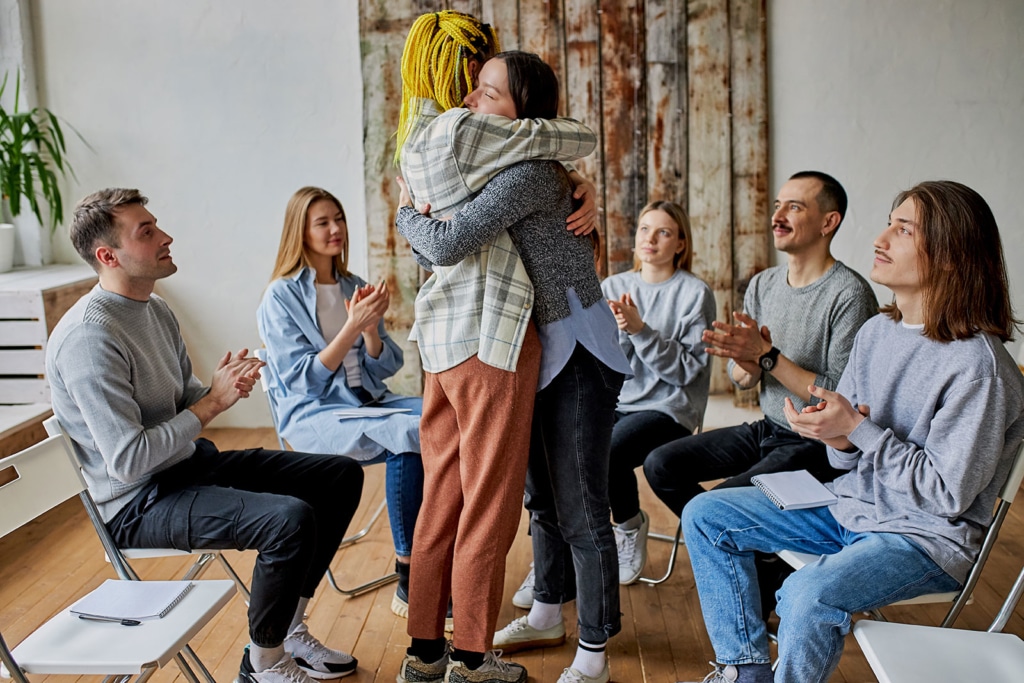At NJ Addiction Resources, we understand that recovery from substance use disorder is a complex journey. While individual therapy plays a vital role, group therapy offers unique benefits that can significantly enhance the recovery process. This article explores the power of group therapy for addiction treatment in New Jersey.

Table of Contents
What is Group Therapy?
Group therapy, also known as group psychotherapy, involves a small group of individuals meeting regularly with a trained therapist or facilitator to discuss shared concerns and work towards positive change. It provides a supportive and confidential environment where members can connect with others who have similar experiences, learn new coping skills, and gain valuable insights. Group therapy sessions can address various issues, including substance abuse, mental health disorders, social anxiety, and interpersonal relationship challenges.
Benefits of Group Therapy for Addiction
Group therapy offers a multitude of benefits for individuals struggling with substance use:
- Reduced Isolation: Addiction can be isolating. Group therapy provides a sense of community and belonging, reducing feelings of loneliness and alienation.
- Shared Experiences: Connecting with others who understand the challenges of addiction can be incredibly validating and empowering. Group members can share their stories, offer support, and learn from one another’s experiences.
- Developing Social Skills: Group therapy provides a safe space to practice social skills and improve interpersonal relationships. It can help individuals develop healthier communication patterns and build stronger support networks.
- Learning Coping Skills: Group members can learn new coping skills and strategies for managing cravings, triggers, and difficult emotions. They can also receive feedback and support from others as they practice these skills.
- Increased Self-Esteem: Sharing experiences and receiving support from others can boost self-esteem and confidence. Group members can gain a sense of accomplishment as they progress in their recovery.
- Cost-Effective: Group therapy is often more affordable than individual therapy, making it an accessible option for many individuals.
- Accountability: Being part of a group can provide a sense of accountability, motivating individuals to stay committed to their recovery goals.
- Altruism: Helping others in the group can be therapeutic in itself, fostering a sense of purpose and meaning.
Types of Group Therapy
Several types of group therapy exist, including:
- Psychoeducational Groups: These groups focus on providing information and education about addiction, recovery, and related topics.
- Support Groups: These groups offer a safe and supportive environment for individuals to share their experiences and connect with others facing similar challenges. (While similar, support groups are often peer-led and not facilitated by a licensed clinician like in group therapy.)
- Cognitive Behavioral Therapy (CBT) Groups: These groups focus on teaching and practicing CBT skills to identify and change negative thought patterns and behaviors related to addiction.
- Interpersonal Process Groups: These groups focus on exploring interpersonal relationships and improving communication skills. Yalom’s work, The Theory and Practice of Group Psychotherapy, is often referenced in this type of group therapy.
What to Expect in Group Therapy Sessions
In group therapy sessions, you can expect:
- A safe and confidential environment.
- A trained therapist or facilitator to guide the group.
- Opportunities to share your experiences and listen to others.
- Learning new coping skills and strategies.
- Constructive feedback and support from group members.
- Discussions about various topics related to addiction and recovery.
Finding Group Therapy in New Jersey
If you are seeking group therapy for addiction in New Jersey, NJ Addiction Resources can help. We can connect you with qualified mental health professionals, including therapists, psychologists (as members of the American Psychological Association, APA), and psychiatrists, who offer group therapy sessions. Many providers offer both in-person and online group therapy options. The American Group Psychotherapy Association (AGPA) is another resource for finding qualified group therapists.
Is Group Therapy Right for Me?
Group therapy can be beneficial for anyone struggling with addiction. It can be used in conjunction with individual therapy or as a standalone treatment. Research, including randomized controlled trials, supports the effectiveness of group therapy for various mental health conditions, including substance use disorders. A clinician can help determine the most appropriate type of group therapy based on individual needs.
The Power of Connection
Group therapy provides a powerful platform for healing and growth. By connecting with others who understand the challenges of addiction, individuals can find strength, support, and hope for a brighter future. Contact NJ Addiction Resources today to find group therapy options in New Jersey and begin your journey toward recovery and well-being.
